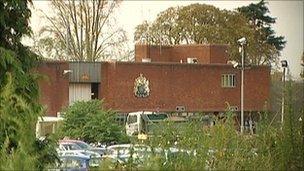Boris Johnson's use of reoffending data criticised
- Published

Young inmates are hand-picked for the 30-bed Heron Unit at Feltham Young Offenders Institution
The UK Statistics Authority has made a complaint following London Mayor Boris Johnson's claims about juvenile crime.
It comes after BBC London reported the mayor made misleading statements about re-offending rates among inmates released from a new unit at Feltham Young Offenders' Institution.
The watchdog has written to the Home Affairs Committee chairman Keith Vaz.
The mayor's office said he meant to say to the committee that Heron Unit could cut reoffending to "as low as 19%".
Last month Mr Johnson told MPs on the Home Affairs Committee that only 19% of offenders at Feltham Young Offenders' Institution - fewer than one-in-five - were going on to commit further crimes after leaving the Heron Wing.
The wing is funded by the mayor and offers inmates extra support.
The UK Statistics Authority wrote to Mr Vaz saying the claims "do not appear to stand up to scrutiny".
On Thursday the mayor admitted that rate of reoffending was higher than he had said publicly.
Claims 'complete nonsense'
Boris Johnson first claimed the 30-bed Heron Wing at Feltham was having a "dramatic effect" on re-offending when he visited with Prisons Minister Nick Herbert last November.
He said then that only one in 10 were getting into further trouble.
A press release, still on the mayor's website, said the wing "has a low re-conviction rate of 14%, compared to the 78% reoffending rates for young offenders nationally."
He now admits the current reoffending rate is 40%, although that figure itself is provisional and sources close to the project admit it could get significantly higher.

Mayor Boris Johnson has admitted the reoffending rate was higher than what he had previously stated
It has emerged many of the offenders had only been out of Feltham for a few weeks. The Ministry of Justice said official reoffending rates were based on offenders who had been tracked for more than a year.
BBC London reported that City Hall officials were told expressly that the mayor's claims were unreliable, based on anecdotal evidence and should not be made public.
The civil servant who devised and ran the project at the time, Andrew Morley, told a conference over the summer the mayor's claims were "complete nonsense".
In his letter to Mr Vaz, the chairman of the UK Statistics Authority Sir Michael Scholar wrote: "The mayor's evidence to your committee is not supported by the Ministry of Justice's published statistics… nor is it supported by any statistical analysis published by the mayor."
He added: "Advice about the limitations of the figures was not followed.
"The comparisons that have been made between national reoffending rates and reoffending rates at the Heron Unit are inappropriate - it is not explained that these comparisons do not control for the different characteristics of offenders.
"It would assist informed public debate on this matter if there were a proper presentation of the relevant statistical material.
"The work of the mayor's office is not covered by the Code of Practice for Official Statistics - the mayor declined my request that he should voluntarily undertake to conform with the requirements."
'Figures fluctuate'
In a statement Mr Vaz said: "I am very concerned by allegations that the mayor of London may have misled the committee.
"I have written to him requesting confirmation of the figures and an explanation.
"The committee takes these situations very seriously and will not hesitate to recall witnesses who have provided them with unfounded evidence."
The mayor's spokeswoman said: "The mayor explained to the select committee that, at its best the Heron Unit is capable of reducing reoffending to as low as 19%.
"Obviously, these figures fluctuate from month to month and the latest figures indicate a modest increase, which is understandable as the unit takes on more challenging young offenders.
"However indications are that the unit is on track to deliver results considerably lower than national reoffending rates."
- Published20 October 2011